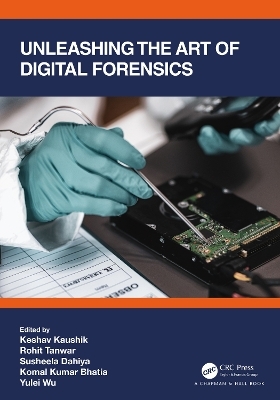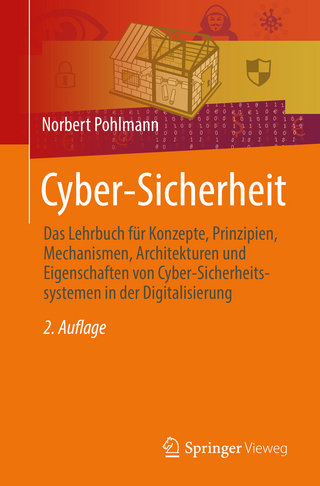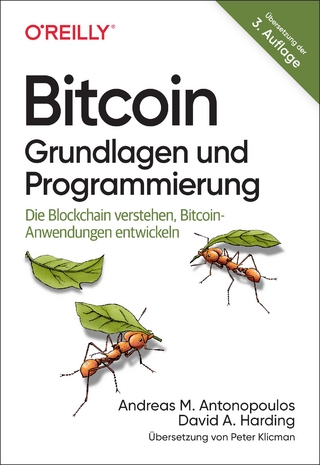
Unleashing the Art of Digital Forensics
Chapman & Hall/CRC (Verlag)
978-1-032-06975-3 (ISBN)
Unleashing the Art of Digital Forensics is intended to describe and explain the steps taken during a forensic examination, with the intent of making the reader aware of the constraints and considerations that apply during a forensic examination in law enforcement and in the private sector.
Key Features:
• Discusses the recent advancements in Digital Forensics and Cybersecurity
• Reviews detailed applications of Digital Forensics for real-life problems
• Addresses the challenges related to implementation of Digital Forensics and Anti-Forensic approaches
• Includes case studies that will be helpful for researchers
• Offers both quantitative and qualitative research articles, conceptual papers, review papers, etc.
• Identifies the future scope of research in the field of Digital Forensics and Cybersecurity.
This book is aimed primarily at and will be beneficial to graduates, postgraduates, and researchers in Digital Forensics and Cybersecurity.
Mr. Keshav Kaushik is an Assistant Professor in the Department of Systemics, School of Computer Science at the University of Petroleum and Energy Studies, Dehradun, India. He is pursuing a Ph.D. in Cybersecurity and Forensics. He is an experienced educator with over six years of teaching and research experience in Cybersecurity, Digital Forensics, the Internet of Things, and Blockchain Technology. Mr. Kaushik received his B. Tech degree in Computer Science and Engineering from the University Institute of Engineering and Technology, Maharshi Dayanand University, Rohtak. In addition, M. Tech degree in Information Technology from YMCA University of Science and Technology, Faridabad, Haryana. He has qualified GATE (2012 & 2016). He has published several research papers in International Journals and has presented at reputed International Conferences. He is a Certified Ethical Hacker (CEH) v11, CQI and IRCA Certified ISO/IEC 27001:2013 Lead Auditor, and Quick Heal Academy certified Cyber Security Professional (QCSP). He delivered professional talks at national and international platforms being a keynote speaker. Dr. Rohit Tanwar received his bachelor’s degree (B. Tech) in CSE from Kurukshetra University, Kurukshetra, India, and master’s degree (M. Tech) in CSE from YMCA University of Science and Technology, Faridabad, India. Dr. Tanwar was awarded his Ph.D. degree in 2019 from Kurukshetra University. He has more than 10 years of experience in teaching. Currently, he is working as an Assistant Professor Senior Scale in School of Computer Science, UPES Dehradun. His areas of interest include Network Security, Optimization Techniques, Human computing, Soft computing, Cloud computing, Data Mining, etc. He has more than twenty publications to his credit in different reputed journals and conferences. He has been associated with many conferences throughout India as TPC member and session chair, etc. Dr. Tanwar is an editor of two books that are under processing with CRC Press and Scrivener Publishing (Wiley). He is a special issue editor in the journal EAI Endorsed on Transactions on Pervasive Health and Technology (Scopus Indexed). He is associated with the International Journal of Communication Systems (SCIE) (WILEY), and International Journal of Information Security and Privacy (IJISP) (Scopus, ESCI), IGI Global as an active reviewer. He is supervising two Ph.D. research scholars in the fields of security and optimization. Dr. Susheela Dahiya, Ph.D. (IIT Roorkee) is working as Assistant Professor at the University of Petroleum and Energy Studies (UPES), Dehradun. She received her M. Tech. (Computer Science & Engineering) and Ph.D. degree from IIT Roorkee. She had also qualified NET and GATE. She has more than eight years of academic/research experience. Her research work is focused on satellite image processing, video processing, cyber security, and cloud computing and deep learning. She is also supervising her Ph.D. students in these areas. She has published several research papers in SCI and Scopus indexed journals and conferences. Dr. Komal Kumar Bhatia is working as a Professor at Department of Computer Engineering at J. C. Bose University of Science and Technology has a work experience of 19 years. He received his B.E., M.Tech. and Ph.D. degrees in Computer Engineering in 2001, 2004, and 2009, respectively. He has guided seven Ph.D. scholars and is currently guiding five Ph.D. scholars. He has also guided more than sixty M.Tech. Dissertations. He has published more than a hundred research papers in reputed journals and conferences and his areas of interest are Information Retrieval Systems, Hidden Web, and Web Mining. Currently, he is also working as Dean, Faculty of Informatics & Computing and Chairman of the Department of Computer Engineering. He is also a member of several professional bodies at national/international level. Dr. Yulei Wu is a Senior Lecturer with the Department of Computer Science, College of Engineering, Mathematics and Physical Sciences, University of Exeter, United Kingdom. He received the B.Sc. degree (First Class Honors) in computer Science and the Ph.D. degree in Computing and Mathematics from the University of Bradford, United Kingdom, in 2006 and 2010, respectively. His expertise is on intelligent networking, and his main research interests include computer networks, networked systems, software-defined networks and systems, network management, and network security and privacy. He has authored one book (Springer) and edited/co-edited three books (two with CRC Press and one with The IET). His research has been supported by the Engineering and Physical Sciences Research Council, National Natural Science Foundation of China, University’s Innovation Platform and industry. He is an Editor of IEEE Transactions on Network and Service Management, IEEE Transactions on Network Science and Engineering, Computer Networks (Elsevier), and IEEE Access. He is a Senior Member of the IEEE, and a Fellow of the HEA (Higher Education Academy).
1. Data Hiding—Steganography and Steganalysis
K.N.D. Saile, V.Y. Bharadwaj, and G.Y. Vybhavi
2. International Cyberspace Laws: A Review
Manik Garg, Susheela Dahiya, and Keshav Kaushik
3. Unraveling the Dark Web
Susheela Dahiya, Manik Garg, and Keshav Kaushik
4. Memory Acquisition Process for the Linux and Macintosh-Based Operating System Using Open-Source Tool
Ravi Sheth and Ashish Shukla
5. Deepfakes—A Looming Threat to Our Society
Raahat Devender Singh
6. Challenges in Digital Forensics and Future Aspects
Shreyas S. Muthye
7. Cybercrimes against Women in India: How Can the Law and the Technology Help the Victims?
Sujata Bali
8. Role of Technology and Prevention of Money Laundering
Smita M. Pachare, Suhasini Verma, and Vidhisha Vyas
9. Novel Cryptographic Hashing Technique for Preserving Integrity in Forensic Samples
S. Pooja, Vikas Sagar, and Rohit Tanwar
10. Memory Acquisition and Analysis for Forensic Investigation
Tripti Misra, Vanshika Singh, and Tanisha Singla
11. Forensics in Medical Imaging: Techniques and Tools
Bhavana Kaushik and Keshav Kaushik
12. Exploring Face Detection and Recognition in Steganography
Urmila Pilania, Rohit Tanwar, and Neha Nandal
13. Authentication and Admissibility of Forensic Evidence under Indian Criminal Justice Delivery System: An Analysis
Bharti Nair Khan and Sujata Bali
| Erscheinungsdatum | 28.07.2022 |
|---|---|
| Zusatzinfo | 20 Tables, black and white; 51 Line drawings, black and white; 140 Halftones, black and white; 191 Illustrations, black and white |
| Sprache | englisch |
| Maße | 178 x 254 mm |
| Gewicht | 603 g |
| Themenwelt | Informatik ► Netzwerke ► Sicherheit / Firewall |
| Mathematik / Informatik ► Informatik ► Theorie / Studium | |
| Naturwissenschaften ► Biologie | |
| Recht / Steuern ► Strafrecht ► Kriminologie | |
| ISBN-10 | 1-032-06975-9 / 1032069759 |
| ISBN-13 | 978-1-032-06975-3 / 9781032069753 |
| Zustand | Neuware |
| Informationen gemäß Produktsicherheitsverordnung (GPSR) | |
| Haben Sie eine Frage zum Produkt? |
aus dem Bereich


